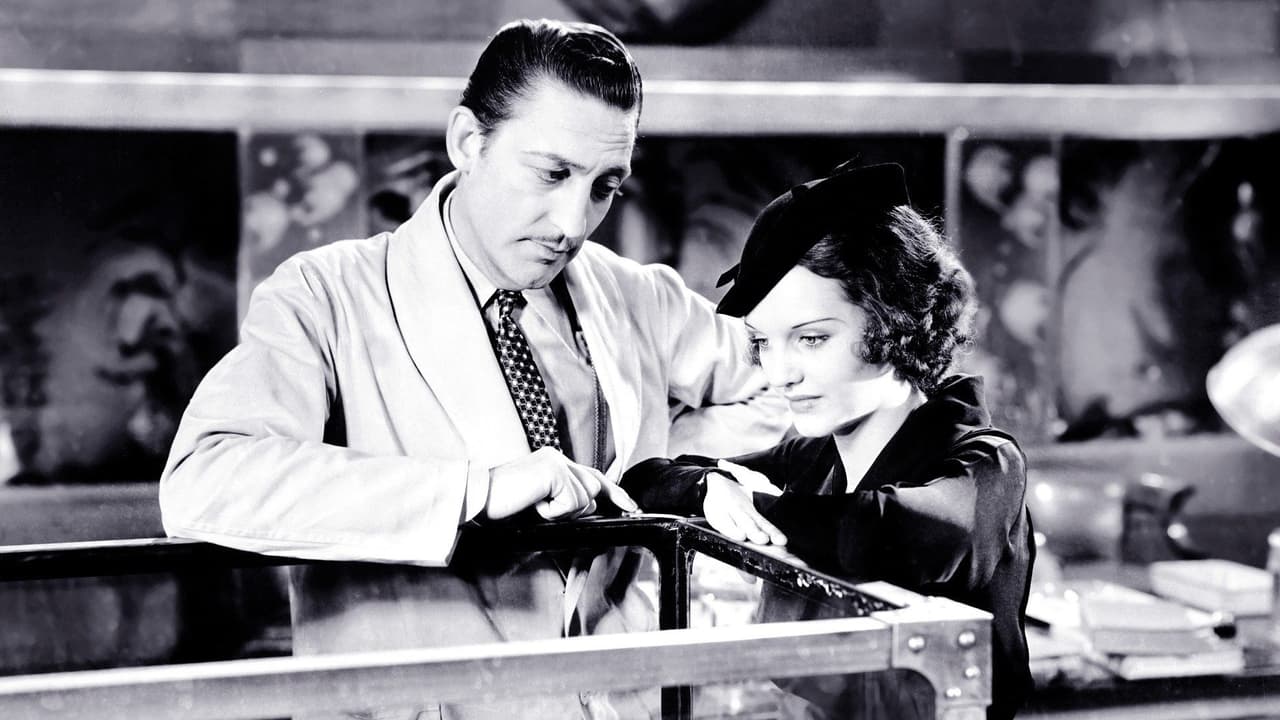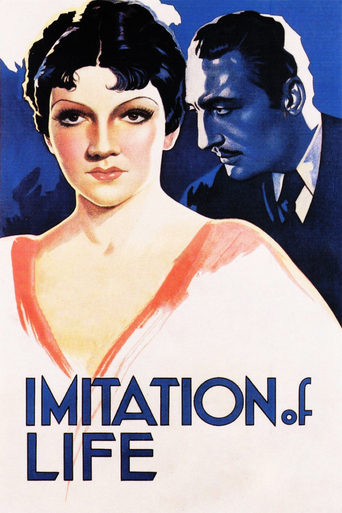



I wanted to but couldn't!
It's funny watching the elements come together in this complicated scam. On one hand, the set-up isn't quite as complex as it seems, but there's an easy sense of fun in every exchange.
View MoreIt isn't all that great, actually. Really cheesy and very predicable of how certain scenes are gonna turn play out. However, I guess that's the charm of it all, because I would consider this one of my guilty pleasures.
View MoreIt's simply great fun, a winsome film and an occasionally over-the-top luxury fantasy that never flags.
View MoreThe iconic Claudette Colbert was the shining star in John M. Stahl's 1934 film Imitation of Life, based on a book by Fannie Hurst of the same title. Colbert along with Louise Beavers, Fredi Washington, and Rochelle Hudson join together to expose the hardships of women who must enter the workforce in a time when women were only to maintain households. In addition to the struggle of a family who lost their patriarch, the audience also experiences through the film the multi- faceted race relations that consumed people of color in the 1930's. The two intertwined tales of personal struggle create a window into the world of the 30's social constructs to engage a whole new audience in their complexities.Bea Pullman (Claudette Colbert) becomes a single mother to her daughter Jessie (Rochelle Hudson) after the death of her husband. Struggling to maintain both the household and her husband's business, Bea is blessed with an angel in the form of housekeeper Delilah Johnson. (Louise Beavers) Delilah comes to Bea's door with a proposition to work for the Pullman family for only room and board in exchange. Delilah is not alone, however, she also has a daughter Peola (Fredi Washington). Peola and Jessie are about the same age and Bea doesn't have the money to hire a much-needed housekeeper; the arrangement seems like a fit for all parties involved, so Bea agrees. The two women become fast friends and eventually spring an idea to market Ms. Delilah's pancake recipe. The idea takes off and the duo becomes incredibly wealthy. No matter how much wealth the two accumulate, Delilah requests that she and Peola remain living with Bea and Jessie. The girls grow together, as much as they can, in a world strained by racism. Jessie, being afforded many more opportunities especially in regards to education, flourishes into adulthood and takes off for college. Peola, however, becomes a victim of intolerance and constantly tows the line between her true self, and the self she assumes when she passes as a white woman. Peola becomes estranged from her mother, due to her deep resentment of Delilah's dark skin. Mother-daughter relationships are difficult enough to navigate, Imitation of Life goes to show that this is an age-old difficulty made no easier by also having to deal with death, racial tensions, and heartache along the way.If you're an old film lover like me, this film will you why you are. There is nothing quite like that softly gleaming glow that a great black and white movie puts off. Claudet Colbert is a national treasure, and if you haven't seen her acting, you should--today. The real power behind this film is its distinct story line. Of course, no one denies the existence of the obvious racism that filled the earlier days of this country. This film takes a unique line of that struggle to focus on the problems that light-skinned black people often went through. Peola could pass for white because her father before her was light skinned. In passing as white, Peola also had to disown her mother. There is no greater pain for a single mother than to be abandoned by her daughter. In contrast, Jessie was afforded much more opportunities due to her skin color and was able to maintain a healthy relationship with her mother. This class distinction was beautifully, and painfully, illustrated in the image of Bea ascending up the stairs while Delilah descended down the stairs immediately following their discussion of college plans of their daughters. This scene depicted, in such a stark way, the level of divide between races at the time, which were present regardless of income. Delilah had amassed a fortune with Bea due to her pancake recipe yet was still treated as a second-class citizen with a daughter that resents her. Many films deal with race, but the added struggle of both the women being single mothers creates a film that will not be forgotten in Imitation of Life.
View MoreI was amazed to learn that there was another version of "Imitation of Life", quite different from the one done in the 50's. Forever, I claimed the Lana Turner version as one of my favorite movies until I saw the original classic done in1934 with Claudette Colbert, handsome Warren Williams and Louise Beaver playing Delilah Johnson.The dedication and loyalty Ms. Beaver showed for her employer was so genuine and touching but, on the flip side, it also showed how naive she was about securing her own future. I immediately associated this film with the story of Aunt Jemima, since that title is synonymous with the "Mammy prototype" which can be categorized as a black female servant who is extremely protective of her white employer and feels she must take care of her. Miss Colbert, on the other hand, displayed admiral qualities since she insisted that Ms. Beaver profit from her labor.I think minorities would appreciate this version more than the latter because the "lessons learned" would have more significance.Great Storyline
View MoreThis 1934 filmed version of the story, which is well written, acted and directed, is the one worth watching. The 1959 version, which is none of these things, has purely historical interest. And the historical interest is this: if these films are anything to go by, in the 25 years between them race relations and the filming-making craft in America both went into reverse. Concentrating on the treatment of race for a moment, while the rabbit's foot and the 'will to death' clichés about African Americans have gone out of the story by 1959, opportunities and recognition for their race are seemingly more elusive than before. The Annie character in the earlier film is a business partner (albeit an unequal one, a '20%er') of her white friend; in the latter version she is no more than her maid and occasional confidante. In the 1934 version, Annie's daughter conforms to the 'tragic mulatto' stereotype but retains personal dignity; in the 1959 version she conforms to the 'promiscuous mixed-blood' stereotype and ends in the gutter. Both scripts struggle to interconnect the relationship between the ambitious white woman and her daughter and the relationship of the black woman and her daughter, in terms of dramatic action, thematic content and comparative time on screen. Although the films place both relationships under the one roof, they run largely in parallel: problems of 'white folks' and problems of 'black folks' are perceived to be so separate. The latter version does worse in this regard. At least the 1934 version tries to bridge the gap by having the Claudette Colbert character go in search of the runaway Sarah Anne. Lana Turner's character just pitches in a few trite comments. This lack of emotional commitment robs the final scene in the 1959 film of any of the power that is present in the earlier version when Colbert goes to comfort Annie's daughter at the hearse. With its undistinguished supporting cast, a terrible score and sometimes laughable dialogue, the remake would, I suspect, have disappeared from critical discussion had it not for its 'controversial' subject-matter and the star pull of an aging Turner. The 1934 version still looks and feels somewhat brave; certainly it has a lot more heart and quality. The DVD's quality in sound and image are also good.
View MoreFirst, I have a question: What's with IMDb listing Dorothy Black playing Peola at age 35? This version I saw ends with her at 19 crying at her mother's funeral and still played by Fredi Washington. Was there an extra scene missing? Anyway with that out of the way, I found this movie interesting with the relationship between Claudette Colbert and Louise Beavers being nearly equal as being more friends as opposed to boss/employee even though Delilah kept calling Bea, Miss Bea, to the end of her days. Those scenes were so interesting and that of Beavers and Washington more so especially their last confrontation when Delilah still wants to be called Mammy and not some white woman's parent title (no offense to Bea, of course), that Bea's scenes with her potential husband (Warren William) and grown daughter (Rochelle Hudson) are sappy and a little melodramatic by comparison. I'd also like to praise the child, Sebie Handricks, that played Peola at age 4. She was really good. Ned Sparks as Bea's business partner is amusing with his sour disposition though a little of him goes a long way. I do wonder how many of the people at Delilah's funeral were her friends and how many were simply Bea's that simply came at her request because of Delilah's request of wanting a big one. I also wonder about the trailer that played on the VHS tape before the movie that emphasized Beavers and Washington in still frames with critical notices of them that probably played in segregated black theatres and how the intended audience reacted when their parts were small compared to the white actors. Despite those mixed reactions, I still recommend Imitation of Life.
View More